 As usual, the incoming President has almost no clue what he's talking about. Not that he cares or that it matters. That's especially true, as discussed on today's BradCast, when it comes to elections and voting laws. [Audio link to full show follows this summary.]
As usual, the incoming President has almost no clue what he's talking about. Not that he cares or that it matters. That's especially true, as discussed on today's BradCast, when it comes to elections and voting laws. [Audio link to full show follows this summary.]
FIRST UP... It's another one of those fire-hose news days akin to what we experienced, day after day, during the first Trump term. We can only cover what we can cover. So, we start with the news, as reported by CNN today, that the House Ethics Committee voted in secret earlier this month to release the report from their years-long investigation of allegations against now-former Rep. and now-former Attorney General nominee Matt Gaetz. The report, which Republicans on the bipartisan panel voted against releasing in November, is said to focus on allegations of Gaetz' salacious sexual misconduct with minors, illicit drug use, and other crimes, potentially included bribery and more. CNN says the Committee has decided to make the report public "after the House's final day of votes this year" unless they "change course now that it has voted."
NEXT... In an update to a story we've been following since last month's election, the North Carolina State Board of Elections has decided it will not order a full hand-recount in the election for State Supreme Court between the incumbent Democrat, Justice Allison Riggs, and her Republican opponent, Jefferson Griffin. The original computer-reported tally from the November 5 contest found Riggs defeated Griffin by 623 votes out of more than 5.5 million ballots cast. A Griffin-requested machine recount widened Riggs' lead to 724 votes over the Republican challenger, who then requested a hand-count. State law allows a small number of precincts in each county to be hand-counted before ordering a full hand-count in the event that the smaller audit is way out of line with the computer recount. In the hand-count samples in all 100 counties in NC, both candidates picked up votes (Riggs gained 70, Griffin picked up 56), but it was not enough to trigger a full, statewide hand-count. With Riggs declared the certified winner, Griffin is also seeking to toss some 60,000 ballots out entirely, claiming those voters, including military and overseas voters, were either not entitled to vote or to have their votes counted. The matter is expected to end up at the state Supreme Court. Presumably, Justice Riggs, one of just two remaining Democrats on the seven-person High Court, will recuse herself if that happens.
THEN... Donald Trump has been vowing and/or threatening to end Joe Biden's "EV mandate" on "Day One" when he takes office, even though there is no Biden "EV mandate." A week or so ago on Meet the Press, Trump reiterated his plans to sign Executive Orders to "end the electric mandate immediately for the cars" and for "ending a lot of the environmental things that were ridiculous that hurt our country very badly and didn't do anything for the environment...ya know, standard things." This week, Reuters has an exclusive report on the specific plans from the Trump Transition team for those "standard things", including what the news outlet describes as "sweeping changes to cut off support for electric vehicles and charging stations" and to redirect that funding to "national-defense priorities." The plans also involve reversing California's (and twelve other states') emission standards that save lives and reduce energy prices for residents, and doing away with the Biden administration's $7,500 consumer tax credit for EV purchases, a policy expected to harm U.S. automakers like General Motors (if less so for Tesla, whose CEO spent more than a quarter of a billion dollars to get Trump elected). But all of those things may be easier said than done, certainly on "Day One", as Desi Doyen explains.
FINALLY... Speaking of easier said than done, Donald Trump has also been demanding changes to voting and election laws, most prominently after he began falsely claiming that the 2020 election was stolen from him. Earlier this month, he declared at a Fox "News" event, once again, that "we want to have paper ballots, one-day voting, voter ID, and proof of citizenship" among other changes to election law that he has repeatedly called for. He doesn't seem to understand most of the things he's demanding, nor care about the fact that some of the measures would disenfranchise millions of Americans.
We're joined today by JOSHUA A. DOUGLAS, election law professor at the Univ. of Kentucky College of Law; author of a number of recent books on American democracy, and now the host of the Democracy Optimist podcast and companion newsletter.
This week, at Washington Monthly, Douglas explained why Trump, in truth, will have "little official power to implement the new rules he supports," given that the U.S. Constitution gives most power regarding elections to the states. While Congress has certainly adopted a number of landmark federal voting laws over the years, Douglas tells me today, "it's really a process of local control. The President himself cannot issue an Executive Order or some sort of decree that elections should be changed one way or the other without states being the ones to pass those laws --- or Congress, but that's a difficult path, as well."
"The President doesn't have any power unilaterally to dictate election rules," says Douglas, while recognizing that Trump will have both the bully pulpit to muscle Congress and states into adopting new laws and rules, along with the power to appoint members of the Federal Elections Commission (FEC) and Election Assistance Commission (EAC) and, particularly in Trump's case, to direct his Dept. of Justice to enforce certain laws and ignore others. "But the President, under the Constitution, doesn't have any formal powers to regulate elections, beyond signing or vetoing a Congressional law."
We step through some of the specific measures Trump has been demanding, such as "paper ballots" (which the vast majority of voters already use), "one-day voting" (ending absentee and early voting), Voter ID (already mandated by most states and, under federal law, already required when registering voters in all 50 states), and the point that most concerns Douglas, "proof of citizenship" when registering to vote. If actually adopted at the federal level, he argues, it would likely disenfranchise tens of millions of voters and become "a real logistical nightmare for election officials."
The efforts by Republicans to change election laws on the state level, are a different matter, as Douglas explains as well. But, bottom line, there is no "magic wand" for Trump to use to undermine elections by himself, much less on "Day One". And there are quite a few things that YOU can do, to stop him and anyone else who would try to restrict our right to vote.
Given recent events, is Douglas still the "democracy optimist" he was when he originally named his podcast and newsletter earlier this year? Tune on in to find out...
(Snail mail support to "Brad Friedman, 7095 Hollywood Blvd., #594 Los Angeles, CA 90028" always welcome too!)
|


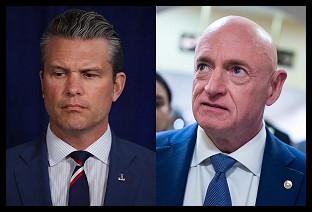 Court Blocks Hegseth Censure of Sen. Mark Kelly
Court Blocks Hegseth Censure of Sen. Mark Kelly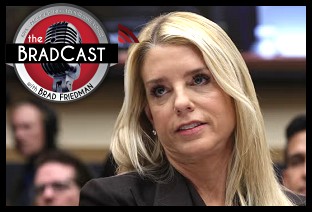 Harpy Tantrums, Legal Losses, Election Fails, Retreating ICE and Other Hopeful Signs: 'BradCast' 2/12/26
Harpy Tantrums, Legal Losses, Election Fails, Retreating ICE and Other Hopeful Signs: 'BradCast' 2/12/26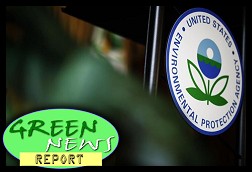 'Green News Report' 2/12/26
'Green News Report' 2/12/26
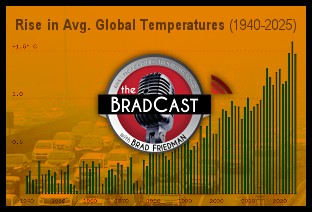 'Let Kids with Asthma Suffer': Trump to Reverse EPA's Landmark 'Endangerment Finding': 'BradCast' 2/11/26
'Let Kids with Asthma Suffer': Trump to Reverse EPA's Landmark 'Endangerment Finding': 'BradCast' 2/11/26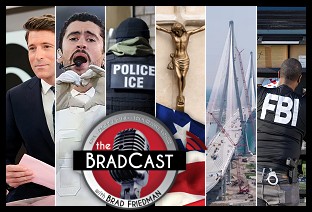 Trump's Presidency Now About Little More Than Racism, Corruption, Culture War Nonsense: 'BradCast' 2/10/26
Trump's Presidency Now About Little More Than Racism, Corruption, Culture War Nonsense: 'BradCast' 2/10/26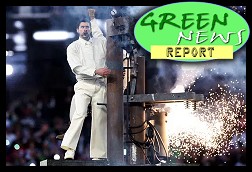 'Green News Report' 2/10/26
'Green News Report' 2/10/26 About Trump's FBI Raid of the Fulton County, GA Elections Warehouse: 'BradCast' 2/9/26
About Trump's FBI Raid of the Fulton County, GA Elections Warehouse: 'BradCast' 2/9/26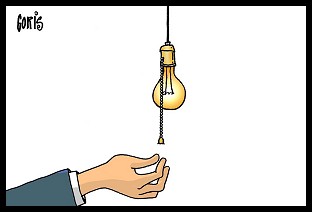 Sunday 'Dead in Darkness' Toons
Sunday 'Dead in Darkness' Toons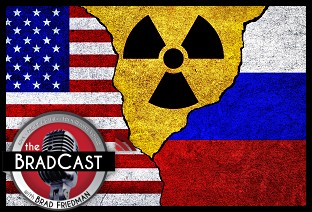 'New START' Treaty Allowed to End Amid New World Disorder: 'BradCast' 2/5/26
'New START' Treaty Allowed to End Amid New World Disorder: 'BradCast' 2/5/26 'Green News Report' 2/5/26
'Green News Report' 2/5/26 Trump Turns 'War on Terror' Tools Against Domestic Political Foes: 'BradCast' 2/4/26
Trump Turns 'War on Terror' Tools Against Domestic Political Foes: 'BradCast' 2/4/26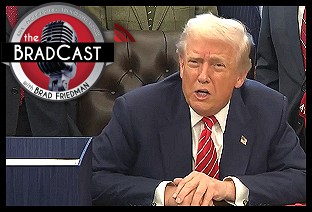 Losing Legally and Politically, Trump Threatens to 'Nationalize' Elections: 'BradCast' 2/3/26
Losing Legally and Politically, Trump Threatens to 'Nationalize' Elections: 'BradCast' 2/3/26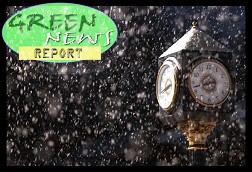 'Green News Report' 2/3/26
'Green News Report' 2/3/26 Bad and Good Bunnies, and an Electoral Shock in Deep 'Red' TX: 'BradCast' 2/2/26
Bad and Good Bunnies, and an Electoral Shock in Deep 'Red' TX: 'BradCast' 2/2/26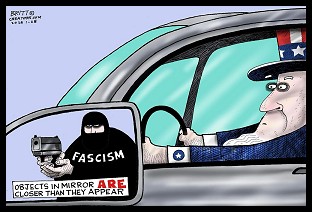 Sunday 'Mirror, Mirror' Toons
Sunday 'Mirror, Mirror' Toons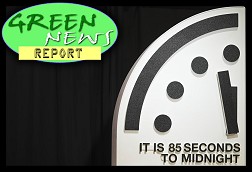 'Green News Report' 1/29/26
'Green News Report' 1/29/26 It's About Elections and the Windmills of His Mind: 'BradCast' 1/29/26
It's About Elections and the Windmills of His Mind: 'BradCast' 1/29/26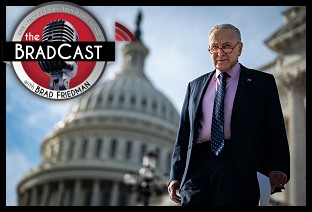 Govt Shutdown Over ICE Funding Near Certain This Weekend: 'BradCast' 1/28/26
Govt Shutdown Over ICE Funding Near Certain This Weekend: 'BradCast' 1/28/26 Trump Blinks, Bovino Out, MN Op Falters, Persists as Midterms Loom: 'BradCast' 1/27
Trump Blinks, Bovino Out, MN Op Falters, Persists as Midterms Loom: 'BradCast' 1/27  The ICE Murder of ICU Nurse Alex Pretti and the Heroes of Mpls: 'BradCast' 1/26/26
The ICE Murder of ICU Nurse Alex Pretti and the Heroes of Mpls: 'BradCast' 1/26/26 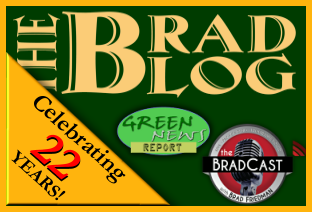 The BRAD BLOG: 22 Years and Still Counting
The BRAD BLOG: 22 Years and Still Counting Mr. Smith Testifies (Publicly) in Washington: 'BradCast' 1/22/26
Mr. Smith Testifies (Publicly) in Washington: 'BradCast' 1/22/26 World Turning Against Self-Destructing U.S. Under Trump: 'BradCast' 1/21/26
World Turning Against Self-Destructing U.S. Under Trump: 'BradCast' 1/21/26 Trump Waste, Fraud, Abuse on Voting, at DOJ, by DOGE: 'BradCast' 1/20/26
Trump Waste, Fraud, Abuse on Voting, at DOJ, by DOGE: 'BradCast' 1/20/26
 VA GOP VOTER REG FRAUDSTER OFF HOOK
VA GOP VOTER REG FRAUDSTER OFF HOOK Criminal GOP Voter Registration Fraud Probe Expanding in VA
Criminal GOP Voter Registration Fraud Probe Expanding in VA DOJ PROBE SOUGHT AFTER VA ARREST
DOJ PROBE SOUGHT AFTER VA ARREST Arrest in VA: GOP Voter Reg Scandal Widens
Arrest in VA: GOP Voter Reg Scandal Widens ALL TOGETHER: ROVE, SPROUL, KOCHS, RNC
ALL TOGETHER: ROVE, SPROUL, KOCHS, RNC LATimes: RNC's 'Fired' Sproul Working for Repubs in 'as Many as 30 States'
LATimes: RNC's 'Fired' Sproul Working for Repubs in 'as Many as 30 States' 'Fired' Sproul Group 'Cloned', Still Working for Republicans in At Least 10 States
'Fired' Sproul Group 'Cloned', Still Working for Republicans in At Least 10 States FINALLY: FOX ON GOP REG FRAUD SCANDAL
FINALLY: FOX ON GOP REG FRAUD SCANDAL COLORADO FOLLOWS FLORIDA WITH GOP CRIMINAL INVESTIGATION
COLORADO FOLLOWS FLORIDA WITH GOP CRIMINAL INVESTIGATION CRIMINAL PROBE LAUNCHED INTO GOP VOTER REGISTRATION FRAUD SCANDAL IN FL
CRIMINAL PROBE LAUNCHED INTO GOP VOTER REGISTRATION FRAUD SCANDAL IN FL Brad Breaks PA Photo ID & GOP Registration Fraud Scandal News on Hartmann TV
Brad Breaks PA Photo ID & GOP Registration Fraud Scandal News on Hartmann TV  CAUGHT ON TAPE: COORDINATED NATIONWIDE GOP VOTER REG SCAM
CAUGHT ON TAPE: COORDINATED NATIONWIDE GOP VOTER REG SCAM CRIMINAL ELECTION FRAUD COMPLAINT FILED AGAINST GOP 'FRAUD' FIRM
CRIMINAL ELECTION FRAUD COMPLAINT FILED AGAINST GOP 'FRAUD' FIRM RICK SCOTT GETS ROLLED IN GOP REGISTRATION FRAUD SCANDAL
RICK SCOTT GETS ROLLED IN GOP REGISTRATION FRAUD SCANDAL VIDEO: Brad Breaks GOP Reg Fraud Scandal on Hartmann TV
VIDEO: Brad Breaks GOP Reg Fraud Scandal on Hartmann TV RNC FIRES NATIONAL VOTER REGISTRATION FIRM FOR FRAUD
RNC FIRES NATIONAL VOTER REGISTRATION FIRM FOR FRAUD EXCLUSIVE: Intvw w/ FL Official Who First Discovered GOP Reg Fraud
EXCLUSIVE: Intvw w/ FL Official Who First Discovered GOP Reg Fraud GOP REGISTRATION FRAUD FOUND IN FL
GOP REGISTRATION FRAUD FOUND IN FL

































